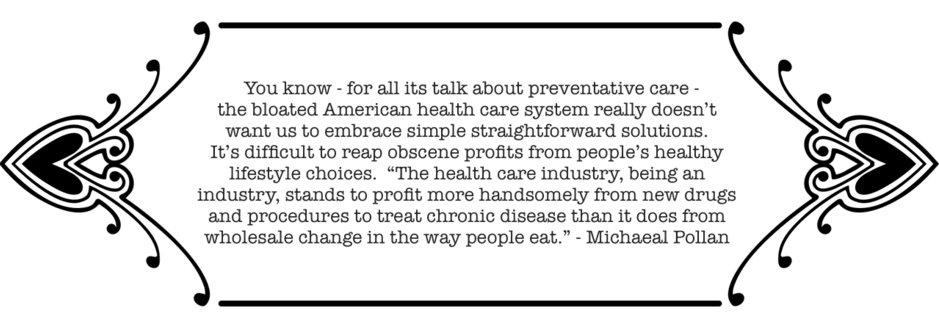some BACKGROUND

Fortunately we already know how to move beyond this bloated, unsustainable system.
Lots of people have been studying, and creating and living alternatives to our energy-intensive, fast-paced consumer culture for quite some time now. For millennia really.
Thank God there are still people all around the globe who've stubbornly maintained their nature-honoring cultures. People who feed and clothe and shelter themselves, using the resources right around them. Folks who still grow food for themselves and their communities, not for profit-driven, multinational organizations. There are even some remaining hunter/gatherers here and there. Hopefully these folks will want to share their regional knowledge and experience with us, so that we can live sustainably in the near future.
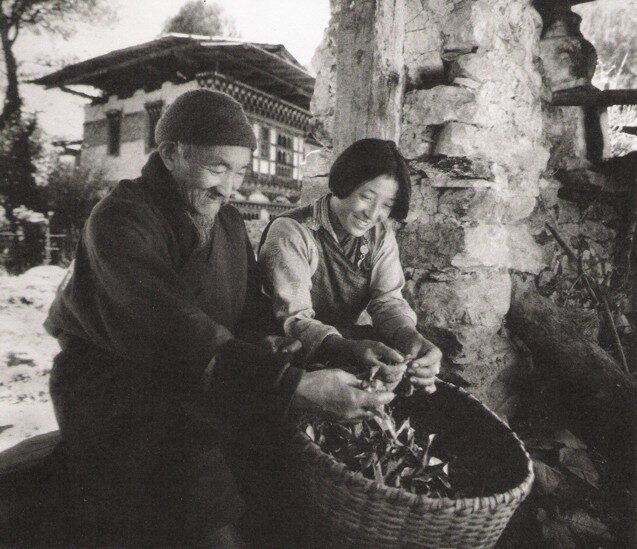 Unfortunately,"Indigenous cultures that have survived for millennia are being rapidly eroded by the forces of globalization, resulting in the extinction of region-specific knowledge that could help future humans live sustainably." Richard Heinberg
Unfortunately,"Indigenous cultures that have survived for millennia are being rapidly eroded by the forces of globalization, resulting in the extinction of region-specific knowledge that could help future humans live sustainably." Richard Heinberg
"Traditional Ecological Knowledge, ( TEK) refers to the evolving knowledge acquired by indigenous and local peoples over hundreds or thousands of years through direct contact with the environment. This knowledge is specific to a location and includes the relationships between plants, animals, natural phenomena, landscapes and timing of events that are used for lifeways, including ... hunting, fishing, trapping, agriculture, and forestry. TEK is an accumulating body of knowledge, practice, and belief, evolving by adaptive processes and handed down through generations by cultural transmission, about the relationship of living beings (human and non-human) with one another and with the environment. It encompasses the world view of indigenous people which includes ecology, spirituality, human and animal relationships, and more. " U.S. Fish and Wildlife Service (photo from "Bhutan" by John Berthold )
Tiokasin Ghosthorse on Traditional Ecological Knowledge (a short video)
"We have to stop with the idea of creating peace on earth and begin with creating peace with Mother Earth. We've tried the first alternative for thousands of years, but look where that has led us; now is the time of the Original Ways, the Native ways, after all ... it is coming this way - that we all must make peace with Mother Earth - there is no more altering the native way." Tiokasin Ghosthorse

Also, thank God for the outsiders ... the hippies, the traditionalists, free-thinkers, artists, and risk takers ... everyone who's refused to become cogs in the wheel.
------------------------------------------------------------------
Perhaps we should reconsider the hippies: Back in the 1960's and 70's, lots of good folks said "no thanks" to the status quo, with its war profiteering, corruption and polluting industry.
We saw the potential for things to go haywire, with the power structure left unchecked ... we saw "peak oil" looming in the future, and the dark endgame of the military-industrial complex.
It was a time of cultural ferment and revolution - an exciting, idealistic time to be a young adult. A whole subculture arose around the principles of peace, love, cooperation and justice for all. We said goodbye to rigid, authoritarian standards for race and gender roles. And explored a wide range of spiritual beliefs. Reconsidered our relationship with the natural world, giving impetus to the growing environmental movement.
Lots of people were experimenting on a grass roots level: rethinking health care ... focusing on workers' rights... creating cooperative businesses and a vibrant free press. Many lived in urban and rural communes. All around the countryside, folks built cute little cabins & huts with readily available, recycled materials. We learned basic skills, like carpentry and midwifery. Some of us worked toward self-sufficiency, tilling the soil and preserving the bounty. We grew a lot of our own food, or gleaned, or bartered for it. Made home-grown music & home-birthed babies
There was a camaraderie that develops when folks live a shared vision of peace.
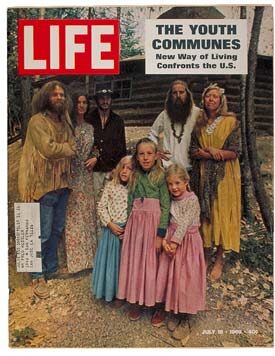
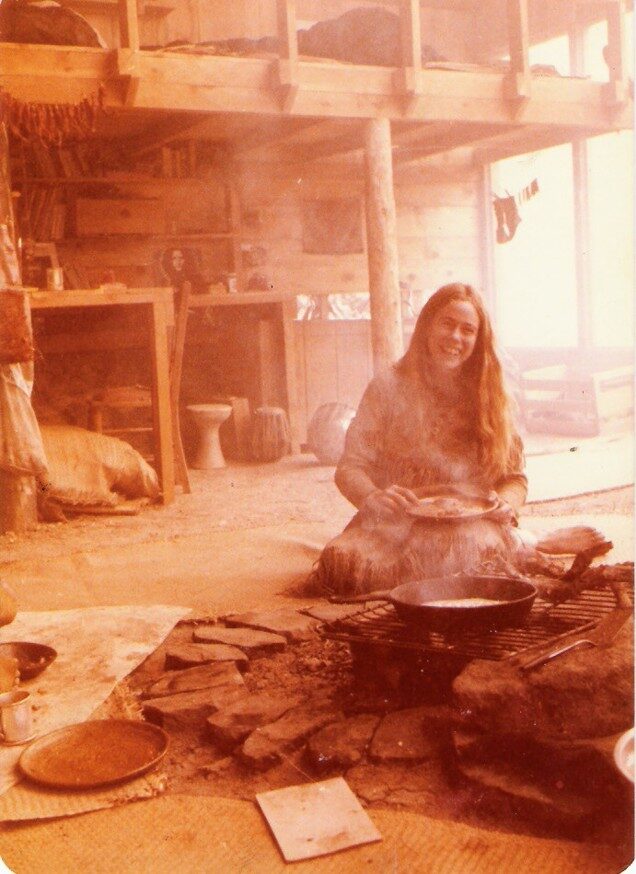
Look at the modern organic food movement.
There were lots of us in the baby boom generation who caught the gardening bug, and started growing wholesome, chemical-free fruits and veggies for our families, communes & neighborhood food co-ops. Some folks got really good at it, and started small organic farms. After working independently to grow, package, and distribute their produce, competition among farmers gave way to collaboration.
Small scale growers got together & worked cooperatively. They shared resources and enjoyed the economies of scale.
Those fledgling farmers set the stage for the vast and successful multi-million dollar networks of organic food distribution that now exist. Here it is, 40/50 years down the road, and we can purchase safe, delicious organics in just about every corner of the country. 
What innovations will come out of the next generations?
"Never doubt that a small group of thoughtful, committed citizens can change the world; indeed, it's the only thing that ever has." (Margaret Mead)
Fortunately there have been folks all along who've been pioneering the way to a healthier environment.
Folks like Amory and Hunter Lovins and their Rocky Mountain Institute who've shown that well engineered buildings, like their headquarters, can be run with an absolute minimum of energy. www.rmi.org
"RMI is engaged in cutting edge research on oil independence, renewable energy technologies, distributed energy, resource planning, green buildings and radically efficient transportation.
And there's Paul Stamets, a Northwest mycologist who has studied the medical properties of mushrooms, and the role of mushrooms in ecological restoration. He advocates for BIOREMEDIATION - the process of cleaning up contaminate environments with microorganisms, fungi, plants and enzymes. Imagine mopping up toxins with fungi !
Paul's video - "6 ways mushrooms can save the world" http://www.youtube.com/watch?v=XI5frPV58tY
Check out John Todd, the co-founder of the New Alchemy Institute, which was "a catalyst of change promoting the development of new ecological design solutions, alternative technologies and methods of ecological food production and waste treatment." Todd designs "living machines"... "developed to restore, conserve, or remediate sewage or other polluted water, by replicating and accelerating the natural purification process of streams, ponds and marshes." http://toddecological.com/ He won the 2008 Buckminster Fuller Award for his efforts to restore environmental and economic health to parts of the Appalachians that have been devastated by coal mining.There's a whole host of unsung heroes out there, working in cooperation with the planet.These are the innovators we should look to, not the Dr. Frankenstein types who clone animals and splice genes from animals into plants. This is no joke. This is the reality of genetic engineering .... where naturally protective, species to species barriers are crossed. Scientists are tinkering with the very web of life, when (for example) they insert genes from flounder fish into tomatoes to make them more cold hardy.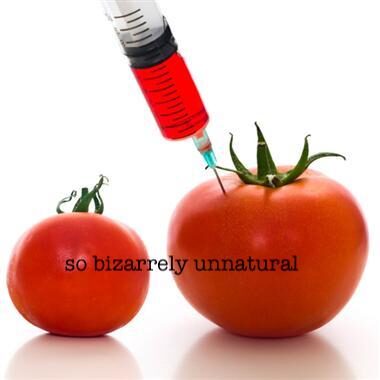 seems like bad science fiction ... unfortunately it's all too real.
seems like bad science fiction ... unfortunately it's all too real.


Back in early 1970's, "a small group of European industrialists and scientists", the so called, Club of Rome, "proposed to examine interrelated global trends, and subsequently they commissioned a report from a team of young systems analysts at MIT."
In their resulting best selling book,"The Limits to Growth" the team reached three basic conclusions:
1. "If the present growth trends in world population, industrialization, pollution, food production, and resource depletion continue unchanged, the limits to growth on this planet will be reached sometime within the next 100 years."
2. "It is possible to alter these growth trends and to establish a condition of ecological and economic stability that is sustainable far into the future. The state of global equilibrium could be designed so that the basic material needs of each person on earth are satisfied and each person has an equal opportunity to realize his or her individual human potential."
3. "If the world's people decide to strive for this second outcome rather than the first, the sooner they begin working to attain it, the greater will be their chances of success."
"What's amazing, in retrospect, is how close we came to actually listening to their message. Around the world, people got to work figuring out how to slow population growth."
"These were the years when America adopted the 55 mph speed limit - when we actually slowed down our mobility in the name of conservation." President Jimmy Carter had solar panels installed on the White House roof. He asked us to turn down our thermostats and put on sweaters.
Carter hosted a reception for E.F. Schumacher -( the publisher of "Small is Beautiful") "I have no doubt that it is possible to give a new direction to technological development, a direction that shall lead it back to the real needs of man, and that also means to the actual size of man. Man is small, and, therefore, small is beautiful."
He also said: “Any intelligent fool can make things bigger, more complex, and more violent. It takes a touch of genius - and a lot of courage to move in the opposite direction.”
- Schumacher urged us :
- to build a "lifestyle designed for permanence"
- to embrace "the evolution of small-scale technology, relatively nonviolent technology, technology with a human face."
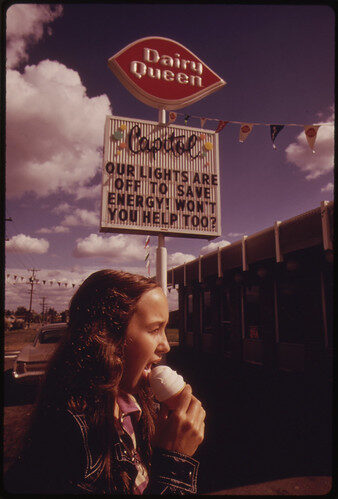
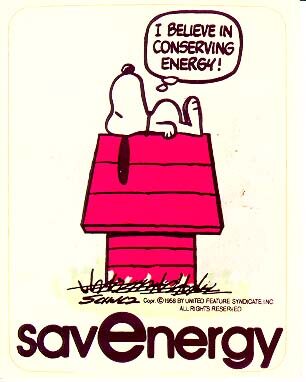
In the 1970's energy conservation was widely practiced throughout society.
Even Exxon promoted "conservation power " in an ad that seemed to put it on par with solar, nuclear and coal power. ..." we can't overlook another source of energy that's readily available to us - our conservation efforts. The National Petroleum Council has estimated that American families could save 14% of the energy used in homes. Over the course of a year, that would save as much oil as our country imports in one month."
Today conservation of energy and resources is rarely mentioned or discussed.
"In the late 1970s more Americans were opposed to continued economic growth than in favor, something that seems almost impossible to us now ...."we actually had a brief opening to steer a different course, away from the rocks. "
Unfortunately we didn't."In the short run, President Ronald Reagan took the solar panels off the White House roof, and he froze the mileage standards that had helped cut oil demand by more than a sixth in a decade." "In the slightly longer run, his worldview gave us not only the Bush administrations but also the Clinton years, with their single-minded focus on economic expansion."
"The change was not just technological; it wasn't simply that we stopped investing in solar energy and let renewables languish. It's that we repudiated the idea of limits altogether - we laughed at the idea that there might be limits to growth."
And now, "every force in our society is trained to want more growth." "The way our economy works at present, any cessation of growth equals misery."
"We've spent two hundred years hooked on growth, and it's done us some good, and it's done us some bad, but mostly it's gotten deep inside us, kept us perpetually adolescent. (from "Eaarth" by Bill McKibben )
I can't help but wonder where we'd be today if the slow growth movement of the 1960s and 70s had flourished and taken root.Where would we be now, if we'd heeded the warnings, and steered our economy toward a relatively graceful descent?
What if instead of super-sizing every aspect of our society, we had chosen a different, more humane way of living on the planet?
These days I'm so glad I was introduced to ideas of voluntary simplicity during the back-to-the-land movement. It's been decades since I've lived on a commune, but ever since then, wherever we've lived, I've tried to base my lifestyle choices on the principles of Voluntary Simplicity.
And now more than ever, with our current rocky economic outlook,
I'm pleased to know how to Do More with Less.
In good times and bad, my husband and I enjoy a pleasant standard of living, simply because we live a pretty basic lifestyle. Even though we've teetered on the high end of America's so-called poverty rate, we're incredibly rich in comparison to the vast majority of folks on the planet.
We're blessed with such amazing abundance - foods and consumer goods from around the globe.
- heating and cooling at the flick of a switch.
We've got a nice solid old home we can make our own, and a large circle of loving friends and family.
Because we try to be fairly self-sufficient, my husband and I could get by working part-time (before we retired).
* growing fruits and veggies in our yard
* preparing our meals from scratch
* doing some of our own home maintenance
* fixing our 2nd hand cars when possible
Working fewer hours gives us plenty of time for creative pursuits.
Time for community projects and volunteer work.
Time for self-care, yoga and meditation.
It's a good life all in all, with dear friends who linger over yummy potluck meals ... salmon seared over a backyard fire .... sides of garden fresh veggies, and lovingly baked desserts.
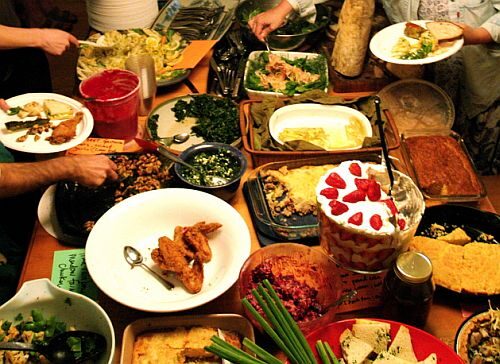
We've got neighbors who help each other out, the way neighbors do ... loaning tools, trading labor, offering a shoulder to cry on.
We keep our entertainment on the cheap and easy ....
... picnics at the local swimming hole when it's too hot to work
... regional camping trips with our daughters and their growing families
... visits to the art museum on free days
... seasonal parties with friends
Know what I mean?
Keeping it Basic. Simple. Conserving Resources.

But sometimes it feels shameful, enjoying such a wonderful life, knowing that over half the developing world's population. (about 2.8 billion people) scrape by on less than $2.00 a day!
It's hard to imagine isn't it? Two dollars buys what? A cup of coffee? Or maybe a pastry?
About 1.1 billion people in the poorest of countries eke out a living on about $1.00 or less a day.
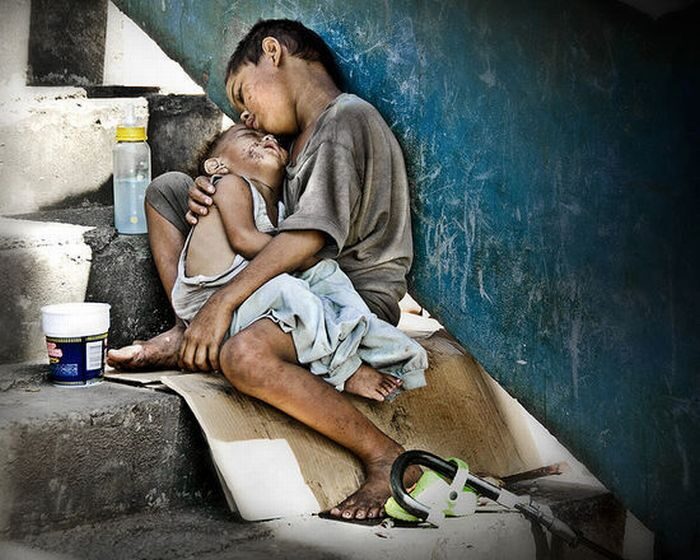
Life is paradoxical. So much suffering. And so much beauty and love.
I look at my country - the USA - and I'm genuinely thankful to live where I have the freedom to pick and choose my lifestyle. But at the same time, I despise the vast and oppressive military-industrial complex of the United States.
Sometimes my heart aches, knowing that American corporations are shoving their agendas down the throats of people around the globe. Pushing folks away from their traditional cultures and values.
Wooing them into crowded cities, with false promises of consumer paradises.
All in the name of profits and market expansion.
Here in the U.S., in this land of opportunity there's so much oppression and pollution going on in the name of profits and so-called "Free Trade". We try to limit that pollution and oppression here, on our own soil. It's convenient to have it out-of-sight, in third world nations - often times in countries that have already been ravaged by the heavy hand of empires, past and present.
"Free Trade" has created factory zones in impoverished lands, where young adults slave long hours for low wages, manufacturing our precious fashions and electronic gadgets. In China, for instance, fenced-in and tightly guarded industrial towns have been built, where hundreds of thousands of young factory workers endure long days in conditions so bleak, that some of them end their lives by jumping from upper story windows. (Check out the movie - "The Last Train Home" for an amazing glimpse at factory life in China)
 Slaving away, so that we can have endless consumer choices.
Slaving away, so that we can have endless consumer choices.
Global corporations like ADM (Archer Daniels Midland), Monsanto and DuPont, push indigenous farmers to become dependent on genetically engineered seed stocks, available only from them.
"The companies that make the GM seeds also make the weed killers that the plants need to be sprayed with. This means the companies benefit twice from GM crops: once from selling the seeds, and once from selling the weedkillers." ("Getting a Grip" Frances Moore Lappe)
Suicide rates soared in India after farmers were persuaded to stop saving their own seeds and using their natural fertilizers ... as they were pressured to go from their traditional subsistence agriculture into crushing debt with multinational corporations.
In a ten year period, 270,000 Indian farmers took their own lives, often by ingesting the pesticides they'd purchased for their fields. Fortunately, many women have been responding by returning to pesticide free farming, resulting in healthier people and livestock, and freedom from debt.
* Yes - unfortunately, it's business as usual in much of the Third World *
So that we can eat tropical fruits every day of the year.
So that we can have access to a whole smorgasbord of culinary delights.
Free Trade was sold to us as a means to better the lives of people throughout the world. In reality, the gap between the world's rich and poor has continued growing wider.
In 1950, there were about 2 poor people for every rich person on Earth; today there are about 4; and in 2025, when the world's population will be about 8 billion, there will be nearly 6 poor people for every rich person." Thomas Homer-Dixon from "The Upside of Down"
"The people who defend the existing system most aggressively are typically either in the deepest denial, refusing to acknowledge their culture's spiritual emptiness, or else have been the privileged beneficiaries of the system's power and material goods." Robert Jensen - "All My Bones Shake"
And, oh my, how incredibly privileged are those few at the very top of the heap!
This "Free Trade" juggernaut, which continues to widen the gap between haves and have-nots around the globe, is co- created by a vast advertising network, unparalleled in the history of humankind.
It's mind boggling really.
There's so much brainwashing going on in the popular media.
Pushing us to BUY, BUY, BUY, BUY.

We Americans are so very well overfed,
dumbed down & entertained right into complacency,
- the soul numbing trance of excessive material abundance.
We're so jammed full of meaningless snippets of information...
(have you heard the latest Hollywood gossip?)
... so cluttered with sordid crap, that we don't even know our own history.
Studs Terkel, who chronicled modern American life for several decades, said...
"We've got a nationwide case of Alzheimer's, when it comes to knowledge of our recent past."
